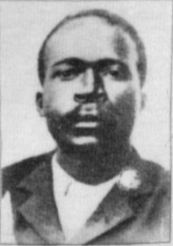Anglican Church
[Source: Manna Leaves, Autumn 2005]

Bernard Mizeki was born in Portuguese East Africa (Mozambique) in about 1861. He left his home when about twelve years old to go for work as a labourer in Cape Town in South Africa. He was there for the next ten years and managed to attend night classes at an Anglican school. Under the influence of his teachers, from the Society of Saint John the Evangelist (SSJE, an Anglican religious order for men, popularly called the Cowley Fathers), he became a Christian and was baptised on 9 March 1886. He mastered English, French, high Dutch, and at least eight local African languages. In time he would be an invaluable assistant when the Anglican Church began translating its sacred texts into African languages.
After graduating from the school, he accompanied Bishop Knight-Bruce to Mashonaland, a tribal area in Southern Rhodesia (now Zimbabwe), to work as a lay catechist. In 1891 the bishop assigned him to Nhowe, the village of paramount-chief Mangwende, and there he built a mission complex. He prayed the Anglican hours each day, tended his subsistence garden, studied the local language and cultivated friendships with the villagers. He eventually opened a school and won the hearts of many of the Mashona through his love for their children.
In time he moved his mission complex up onto a nearby plateau, next to a grove of trees sacred to the ancestral spirits of the Mashona. Although he had the chief’s permission, he angered the local religious leaders when he cut some of the trees down and carved crosses into others. Although he opposed some local traditional religious customs, Bernard was very attentive to the nuances of the Shona Spirit religion. He developed an approach that built on people’s faith in one God, Mwari, and on their sensitivity to spirit life, while at the same time forthrightly proclaiming Christ. Over the next five years (1891 – 1896), the mission at Nhowe produced an abundance of converts.
Many black African nationalists regarded all missionaries as working for the European colonial governments. Bernard was warned to flee during an uprising in 1896, but refused because he did not regard himself as working for anyone but Christ and would not desert his converts. He was fatally speared outside his hut on 18 June 1896.
The place of his death at Marondellas in Zimbabwe has become a focus of great devotion for Anglicans and other Christians. Pilgrims from many countries, including Mozambique, go there every June to attend one of the greatest of all Christian festivals in Africa.